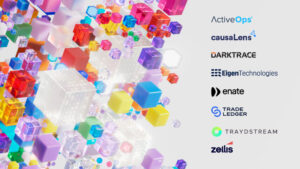
Make a difference with our AI for Good Accelerator Programme
Are you a start-up or organisation looking for support for your AI-driven solution? Apply for the Microsoft UK AI for Good 2020 accelerator programme, designed to help UK purpose-driven ventures advance their AI solutions and create positive societal change.
Now in its second year, the Accelerator builds on last year’s success, which saw 11 organisations graduate, all of whom reported positive impact on their business following the programme.
Launched by our Chief Environmental Officer Dr Lucas Joppa, the UK AI for Good Accelerator will be run by Microsoft for Startups and the Social Tech Trust from our accelerator space in Shoreditch, London. At launch, Joppa said:
“AI is one of the most important tools we have to accelerate innovation at the speed and scale we need to address climate change and other important societal challenges. It’s exciting to see Microsoft’s AI for Good initiative evolving to engage new partners and help catalyse social impact organisations across the UK.”
An equally enthusiastic Ed Evans, CEO of Social Tech Trust, said:
“We have an exciting opportunity to help more social tech ventures to shape the future we want to see, using AI. I’m inspired by the growth we’ve seen from the 11 ventures in our first cohort and can’t wait to see the very best UK social tech innovations that emerge as we open applications for our second AI for Good programme, in partnership with Microsoft.”

AI’s positive impact
41% of UK business leaders believe AI is set to have a positive impact on the UK economy. These findings, drawn from our research report ‘Accelerating competitive advantage with AI’, indicates the UK is starting to see the benefits of AI in practice.
Aligning with Microsoft’s mission to empower every person and every organisation to achieve more, previous cohort members all have a fundamental commitment to driving positive societal impact in four key areas:
- AI for Earth, designed for organisations using AI to build a sustainable future and address global environmental concerns spanning agriculture, biodiversity, climate change, and water.
- AI for Accessibility, focused on organisations with AI solutions that help everyone in their daily life, employment, and communication and connection.
- AI for Humanitarian Action, for non-profit and humanitarian organisations providing disaster responses, human rights protection, and support for refugees, displaced people or children.
- AI for Cultural Heritage, our newest category, aims to empower people and organisations focused on the preservation and enrichment of cultural heritage. This includes celebrating the people who have made significant impact throughout history, developing digital tools to preserving important monuments for the future generation, engaging with communities for language preservation, and creating ways for collections and archives to be more easily accessed and enjoyed.
Organisations can apply to join our programme from now until November 22 2019, telling us how they’re developing an AI solution for good in any of the four categories.
[msce_cta layout=”image_center” align=”center” linktype=”blue” imageurl=”https://www.microsoft.com/en-gb/industry/blog/wp-content/uploads/2019/10/CTA.jpg” linkurl=”https://aka.ms/Cohort2020″ linkscreenreadertext=”Application page for the AI for Good 2020 programme” linktext=”Apply for AI for Good 2020″ imageid=”17040″ ][/msce_cta]
An expert-led curriculum for purpose-driven UK ventures
For four months, beginning in February 2020, your organisation will benefit from the resources, advice, and one-to-one support you need to help scale your AI project with Microsoft, Social Tech Trust and our other key partners.
Our expert-led curriculum covers technical guidance to business development and marketing; it’s packed with workshops, seminars, and tightly focused modules on topics including AI and social impact frameworks.
Last year, we saw some truly inspiring successes across each of our social programmes, with organisations focused on optimising not just their solution, but their entire business structure.
Reflecting on her time on the accelerator programme, Isabel Van de Keere, CEO of Immersive Rehab, which uses virtual reality to improve the effectiveness of physical and neurorehabilitation, said:

“The programme has been and still is extremely valuable for Immersive Rehab. Not only did it give us the opportunity to define our AI strategy further, we are also still in touch with experts in the field of AI, Immersive Tech, and Healthcare at Microsoft to take our solution to the next level.”
Microsoft strongly believes that when built with people in mind, AI technology has the power to extend our capabilities well beyond our limits, amplifying human ingenuity and empowering us all to achieve more.
Our AI for Good programme not only helps local businesses bring AI solutions to market, but also creates a global consensus about the need to develop responsible, ethical AI. Given there are around 70,000 social enterprise businesses in the UK contributing over £24 billion to the economy, this means that the country can lead the development of responsible AI solutions, for the good of everyone.
According to Hugh Milward, Microsoft UK’s Director, Corporate External and Legal Affairs:
“It’s not enough that AI has the power to transform the way we do things. We must also make sure we use AI as a tool for social good. I’m thrilled that we’re going to welcome another cohort of organisations creating social change in the UK. Having seen first-hand the impact last year’s group had, I hope that this year we can help even more organisations to make a difference.”
We’re excited to welcome the next group of ventures, start-ups, and social enterprises harnessing the power of AI to transform the world for the better.
Applications have now closed for our AI for Good accelerator programme – watch this space as we announce the 12 selected startups for our 2020 cohort!”




